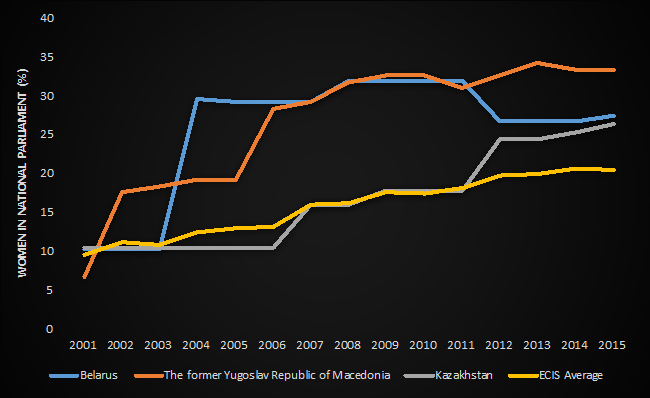--- Image caption ---
The past 20 years has seen the Europe and Central Asia region undergo tremendous changes. Our recently launched platform on Sustainable Development Goal 16 details some of those changes and how UNDP is supporting progress.
Here are four quick takeaways.

Political Stability and Absence of Violence/Terrorism in the Western Balkans – 1996 to 2015. Source: Worldwide Governance Indicators. Includes Albania, Bosnia and Herzegovina, Serbia, Montenegro, North Macedonia and Kosovo.
1. Conflicts end, but their shadows remain
After several violent conflicts in the 1990s, the Western Balkans region has progressed significantly. Two countries are now fully fledged members of the European Union (Slovenia and Croatia), and the remaining countries and territories are positioning for accession.
However, corruption, inadequate infrastructure, politicized education systems, violence against women and underemployment continue to be serious challenges throughout the Western Balkans. Political opportunists seem to be channelling popular frustrations with these problems into reopening old ethnic and religious divisions.
The Western Balkans is not alone in facing these challenges. The Fergana Valley in Central Asia, Ukraine, and other parts of the region also suffer from the legacy of conflict or protracted conflicts. To sustain peace, we must not only strengthen intercommunity relations but also target the underlying sources of frustrations and causes of conflict.
2. An upward trend: Women in Power
A seismic shift in the representation of women in power is taking place across the region.

Women in the National Parliament – 2001 to 2015. Source: The World Bank
Countries as diverse as Belarus, North Macedonia, Serbia, Kazakhstan and Turkmenistan have all shown significant increase of women in national parliament and local councils.
Still, even in countries with relatively high proportions of women in politics, the representation of women in executive, ministerial and leadership positions within their parties remains low.
While cross party women’s caucuses have helped to introduce gender responsive legislation, obstacles remain for transformative laws and policies that result in gender equality progress for all women and girls, particularly those from minority or less advantaged groups.
It is important not be to side-tracked by the improvement in numbers, but rather remain committed to increasing women’s representation at all levels of government, maintaining pressure for women to be promoted to senior positions and ensuring the trails being blazed by women around the region are followed by the next generation.
3. Technology can help shape public services, but is only half the battle
All countries in the region have experienced development gains and are now classified as low to high middle income.
With newfound economic growth, the expectations of the population on government has also increased: citizens now demand transparent decision-making and better services.

GDP (Current US Dollars) – 1996 to 2015. Source: The World Bank
One key response has been a proliferation of innovative methods, e-government services, and an increasing use of open data for more effective service delivery. Models such as ASAN in Azerbaijan and the Hub for Civil Service in Astana Kazakhstan have been supported by UNDP to improve the quality of civil service and public service delivery. The standout success story of the region is Georgia, which has seen large improvements using innovation, with regulatory quality and control of corruption approaching EU average levels.
Yet, the use of innovative models should not mask incomplete reforms. Remote and mountainous areas are not experiencing the same level of development and change as the main population centres. A further push is needed for fiscal decentralization and local government autonomy to generate resources and designate development priorities for growth to be inclusive.
4. Open civic spaces are under threat
In some countries, high levels of political activism and mass protests are evidence of progress in the effectiveness of civil society and civic engagement that can be channelled, through organizations, to productive ends. The rise of ICTs and new forms of media have generated significant demand and ideas for driving change and accountability, particularly from youth.
Recent trends in restricting civic space, however, are a cause for concern. The divergence in voice and accountability across the region can be acutely seen in the civil society space, where the political and regulatory environment remains difficult for civil society and free media. In several countries, it is becoming increasingly hostile. Often a result of attempts to restrict perceived terrorist and extremist groups, this hostility is manifested in legislation being considered and passed in several countries.
However, research shows that feelings of exclusion, injustice and lack of voice in decision-making can be primary drivers of youth radicalization in the region. Policies that crack down on civic space, religious dialogue, and social and other forms of media can exacerbate, rather than ameliorate, these drivers. Deepening freedoms and protections for fundamental human rights will ultimately make societies more, not less, secure and resilient.
To take a more in-depth look at our work on strengthening democratic governance and building peace in the Europe and Central Asia region, click here.

 Locations
Locations
